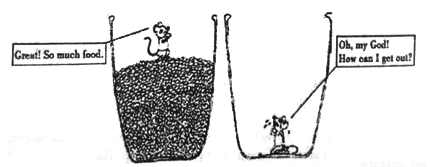题目内容
It is unavoidable that you have one of those days when nothing seems to go right. Although you try to keep a __ attitude towards the day, you find yourself getting worn down and starting to ___about the way things are going. And then __ walks up to you, gives you a smile and asks if you would like to have a cup of coffee with them. The small act of ___brings a smile to your face as you tell them you would love to.
It does not take much ___to perform an act of kindness. The effort is in learning ___it is needed the most and bringing yourself to do it. __ if you had been the person mentioned above who saw you __ throughout your day, you might not have felt so inclined(倾向于……的) to be____More than likely, you would have wanted to keep your distance and be critical of that complaining. But that person ___that you needed that act of kindness to brighten your day. In being ___to have understanding and compassion for others you will find it __ to show kindness to them.
Criticizing others not only makes them defensive against you, but it also __ you from getting what you need or want from someone. __, try to understand why people do what they do. After all they do have their __ for their words and actions. In understanding their motivations, you are breeding tolerance, sympathy and kindness, and the other person will ___his or her defenses.
Dale Carnegie wrote, “ Perhaps you will____tomorrow the kind words you say today, but the recipient may cherish them over a lifetime.” In showing them kindness, they are more likely to be more productive at work as well as at home, and your act of kindness will make a lasting____on them. They are more likely to do nearly anything for you that you ask____they have more trust in you. It is finding the good in people instead of the bad that __ us to motivate them through our kind ways and receive their kindness in return
1.A. doubtful B. neutral C. depressing D. positive
2.A. argue B. complain C. talk D. think
3.A. someone B. everyone C. he D. anyone
4.A. patience B. trust C. kindness D. funniness
5.A. money B. effort C. time D. energy
6.A. where B. how C. what D. when
7.A. In short B. For example C. As a result D. After all
8.A. working B. talking C. worrying D. complaining
9.A. careful B. annoyed C. kind D. disappointed
10.A. understood B. accepted C. promised D. agreed
11.A. able B. certain C. eager D. afraid
12.A. hard B. polite C. easy D. important
13.A. makes B. stops C. allows D. reduces
14.A. Meanwhile B. Then C. Besides D. Instead
15.A. reasons B. decisions C. choices D. rules
16.A. build up B. come to C. let down D. turn down
17.A. explain B. forget C. recall D. recognize
18.A. choice B. decision C. Impression D. comparison
19.A. although B. unless C. once D. since
20.A. turns B. warns C. allows D. introduces
 通城学典默写能手系列答案
通城学典默写能手系列答案

